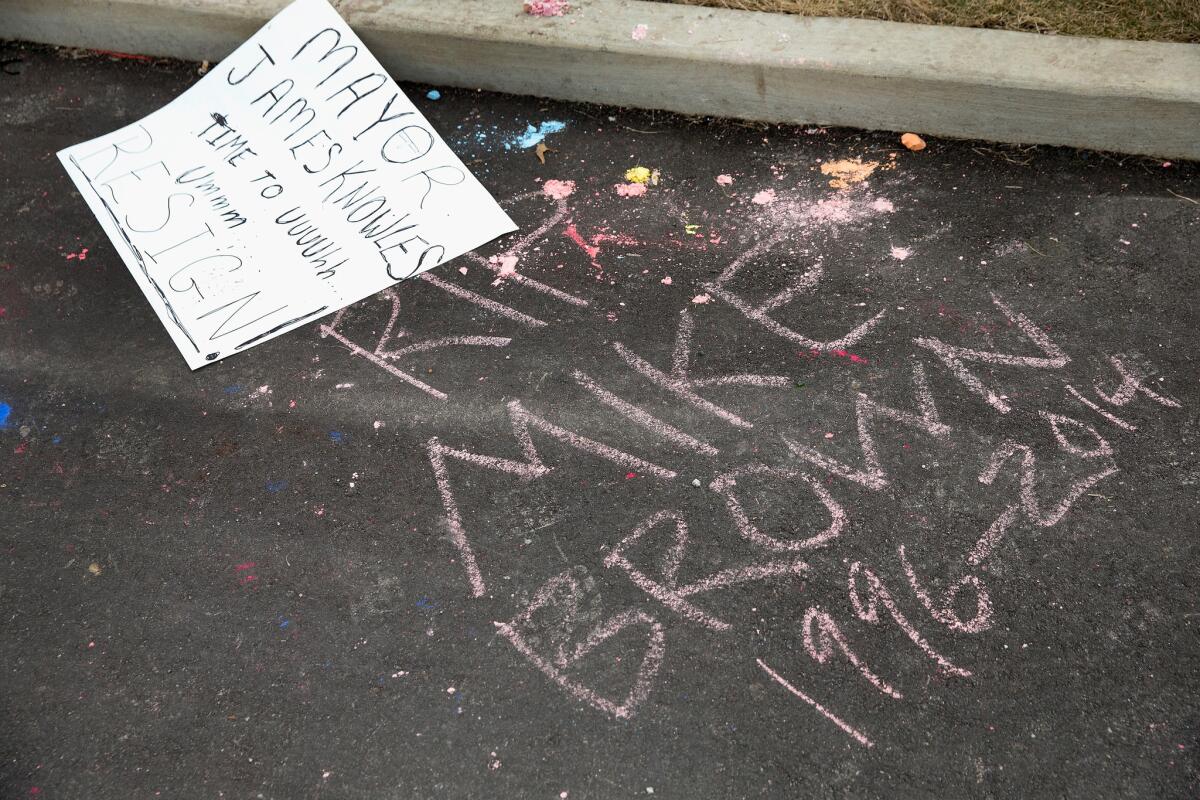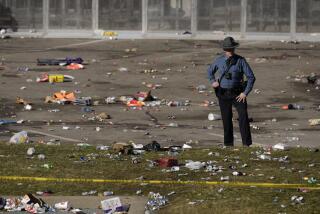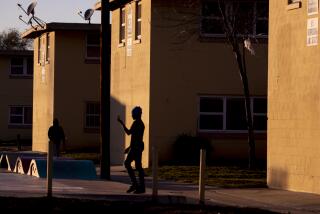Scenes from Ferguson the day after two police officers are shot

- Share via
Reporting from Ferguson, Mo. — Former Ferguson City Councilwoman Susan Ankenbrand and her husband were picking up litter along the street near the Police Department on Thursday, pointing out all the rebuilding that had been going on before two police officers were wounded by gunfire the night before.
People in passing cars shouted, “Thank you!”
This St. Louis suburb has been in turmoil since August, when a white police officer killed an unarmed black man during a confrontation. That led to weeks of protests, unrest and destruction.
Since then, the U.S. Justice Department reported that officers had spread racist jokes and targeted African Americans as a source of city revenue. Several officials resigned, including Police Chief Thomas Jackson on Wednesday, hours before the officers were shot. (Both were treated at a hospital and released.)
Ankenbrand and her husband have lived in Ferguson for 40 years, and she served on the City Council for 16. On Thursday, she stopped in the parking lot of what she said was a black-owned business, a barbecue restaurant preparing to reopen after repairing damage from violent protests. It had a banner strung across the roof advertising the website helpfergusonrebuild.com.
She looked teary. Bishop Derrick Robinson, pastor of Kingdom Destiny Fellowship, stopped to ask how she felt.
“Devastated,” Ankenbrand said.
“Tell me,” her husband asked the pastor, who has been among the protesters. “What I don’t understand, at night, why don’t they go home? The point has been made.”
Robinson disagreed.
“No, our point has not been made. Our children’s lives are still being taken,” he said.
The older man noted that it was police who had just been shot. Ankenbrand interceded.
“As far as I’m concerned, all lives matter,” she said. “If this continues, we have solved nothing.”
---
Across the street from the low, brick Ferguson Police Department building, few protesters or police were in sight. In the parking lot of a tire store across South Florissant Road, the only activity was a small village of TV news trucks with cameras trained on the station.
Passersby strolled down the sidewalk, glancing at the TV crews. But few people gathered as traffic cruised past on a warm, placid workday afternoon.
Keith Watts, 36, noticed the TV crews as he walked toward the police station, listening to music on his headphones. He said he was concerned about more violence and would stay home Thursday night, keeping up with events on TV.
“It’s a little scary to me,” Watts said, referring to the gunfire that wounded the two police officers. “I sort of had a feeling that it was only a matter of time before something happened, but I wish it hadn’t. I was hoping things were getting better.”
Watts, who is African American, said he was not among Wednesday night’s protesters, but had seen the unrest of last summer.
“I saw what happened then, and I hope we don’t see that again,” he said.
---
Jeff Stoll, 59, a white former insurance agent, said he was concerned there had been too much focus on police abuses and not enough on the dangers officers face.
“Black lives matter, sure, but all lives matter – and that includes police officers,” Stoll said. “There are a lot of brave men and women who put up with a lot of abuse, as we saw last night.”
Stoll, who lives in the nearby community of Florissant, said he had hoped Ferguson was healing until the officers were shot. Perhaps, he said, “that was a naive impression.”
He hoped for a peaceful Thursday night in Ferguson. “I hope they put a wet blanket on it and everything settles down,” he said.
---
Shelly Hall, 51, cut a lonely figure as she marched slowly back and forth across the street from the Ferguson Police Department late Thursday afternoon, hoisting an orange sign that read, “No Justice, No Peace.”
Hall, an African American who has lived in Ferguson for 25 years, said she wanted justice for everyone in the city, of all races.
“We need to stop with all this race business,” she said. “It’s not about race. It’s about justice.”
Ferguson, she said, can begin paving the way for that by firing or retraining court and police officials who collaborated in a system that the U.S. Justice Department found victimized citizens – most of them black – by charging and fining them for petty crimes to fill the city’s coffers.
But some protesters “also need some serious retraining,” Hall said. “There are some people out here who think protesting is shooting people.”
Hall said she carried her sign during last summer’s protests, and she intended to keep protesting peacefully until meaningful change takes place.
“This is not going to calm down without things changing in a big way,” she said. “We aren’t just going to stay quiet and go about our lives as if nothing’s wrong.”
But she said she would not be protesting Thursday night because of the shootings the night before. She planned to be inside her home after nightfall.
“After 9 o’clock, it seems like a few people who don’t know how to protest peacefully come out and cause trouble and things get terrible,” Hall said.
As she spoke, a black man driving past pointed at Hall’s sign and shouted: “I’m 35 years old, and the police have been messing with us the same way my whole life.”
---
Gerry Jasper, a part-time community college instructor, lives around the corner from the site of the shootings. She was out Thursday taking photographs dressed in a Ferguson T-shirt she bought at the “I Love Ferguson” store up the street.
“It doesn’t mean we agree with everything - it means we care about our neighborhoods,” said Jasper, who is white and has joined protests and demanded reforms since Officer Darren Wilson shot and killed Michael Brown on Aug 9.
She said she still feels safe and doesn’t want a new police department. But she does want officers to be accountable to all residents.
“We need to learn to talk to each other,” she said.
More to Read
Sign up for Essential California
The most important California stories and recommendations in your inbox every morning.
You may occasionally receive promotional content from the Los Angeles Times.












